|
|
 |
 "One
of these things is not like the others, one of these ___ just doesn't
belong " "One
of these things is not like the others, one of these ___ just doesn't
belong "
-- Sesame Street, Pre-pre-skool coding class
For those who prefer pictures...
Regarding the coding:
 A.
The 16th Amendment does not specify which "incomes"
are taxable, nor who. This information is provided instead by the US
Code, and the Code of Federal Regulations. Fortunately, taxpayers can
use a search engine to find the "excluded income", "eliminated
income", "eliminated items", "specific sources",
etc. A.
The 16th Amendment does not specify which "incomes"
are taxable, nor who. This information is provided instead by the US
Code, and the Code of Federal Regulations. Fortunately, taxpayers can
use a search engine to find the "excluded income", "eliminated
income", "eliminated items", "specific sources",
etc.
B. "Without apportionment"
doesn't contradict the Constitution if and when applied to
foreigners and foreign earned "incomes," which is
exactly how the US Tax Code is encoded. The specific sources and items
are written in Code.
1780's, The Law Begins
1. The income tax law begins
in the Constitution, and "tax" occurs 10 times in the Constitution
and Amendments.
The
Constitution: "tax" (6 times) - these
five are related to tax revenue
| 1913, Taxes on Incomes
The
Amendments:
Notice, that incomes is plural. So, which incomes?
Whose incomes? Specifically, who, what, and where? |
STARTING WITH A SIMPLE PICTURE
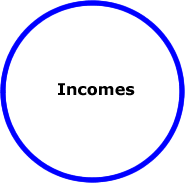
Whose Incomes?
|
|
2. After writing
the 16th Amendment, Congress made laws to implement it. But the
law and the regulations only prescribe...
Notice, the tax is only imposed on taxable
income - whatever the source. Not all incomes are
taxable. So now the picture looks like this...
Because, we are told "income from
whatever source...unless excluded" (in Sec. 61), then
the specific items of income, and specific sources
of income still need to be prescribed (declared) in order for
a computation of tax to occur, because some items may be "excluded".
What is excluded income?
What is taxable income? |
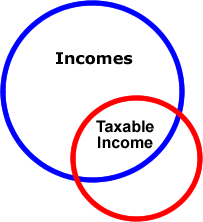
|
3. The Parent Code, found in the
first Article of the Constitution requires:
*Notice, the concept is repeated twice.
If these laws were followed, each taxpayer
would pay their own fair share, regardless of their total income,
or how much a taxpayer works, or how smart they are, or according
to their estate and ability, or any other fortunate circumstances.
Like a cab ride through downtown, everyone pays the same fare.
In the Constitution, each taxpayer is paying
an equal fraction, the fair share distributed according to a census,
not according to someone's income generating abilities. |
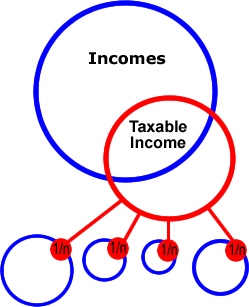
|
|
4. This is how the
Income Tax is currently implemented, but it is unlawful, according
to the code. Here, a greater percentage is taken from those with
larger incomes.
*About code: If something is not written in
the Code, it cannot occur.
Here is an assumption that is difficult to
escape...
- Most of us, 96% of whom don't know anything
about coding or programming - including judges and tax professionals,
will assume that all items are taxable. Even after we've
seen the rules, and we've become well aware that this is not true
(because of "excluded income", "deductions,"
etc), it's still tough to remember this. And, because there are
so many vague statements throughout the Code, like "taxes
on incomes," and "whatever source,"
we tend to convince ourselves that income tax is imposed upon
all income.
"Incomes" is just a term, a subject,
and very broad in scope. But, the Code instructions for this subject
say, it is only "upon taxable income" [CFR Sec. 1].
Other sections also provide rules for "excluded income",
"eliminated income" and "other deductions"
[CFR Sec. 861-8], and even state clearly, that "more
common items (of income) are... excluded... enitrely"
[CFR Sec. 61(b)]. They show that taxing all incomes, is out of
scope, and actually against the law; against the code.
If something is not written in the code, it
cannot occur. Just like if the programmers at Microsoft forgot
to include the code needed to print, then you could never print
anything.
|
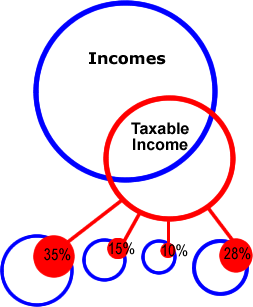
|
5.
The Income Tax Code - As it is actually encoded
# # # # # # # # # # # # # # # # # # # # #
#include <Constitution, Amendments, USC, CFR>
TaxableIncome = whatisTaxed();
whatisTaxed()
{ |
- "direct Taxes shall be apportioned" [Art. 1]
- "No Capitation...unless in Proportion" [Art.
1]
|
 or
or 
|
- "taxes on incomes...whatever source ...without apportionment...and...any
census" [16TH Amendment]
|

|
- "The tax imposed is upon taxable income" [CFR
Sec. 1]
|

|
- "the term 'taxable income' means gross income minus... deductions"
[USC Sec. 63]
|
|
- "gross income means all income from whatever source...unless
excluded" [CFR Sec. 61]
|
 |
- "more common items ...are ...excluded
...entirely ... To the extent that another section (...is
more) specific...such other provision shall apply notwithstanding
section 61"
GET TAX(specific sources);
|

|
- "determining taxable income of the taxpayer from specific
sources" [CFR Sec. 861-8]
- "the rules [of Sec. 861] for determining taxable
income"
[CFR Sec. 863]
- "the sources of income for purposes of the
income tax... See Secs. 1.861-8 and 1.863-1." [CFR Sec.
861-1]
- "how to determine taxable income" [CFR Sec. 861-8]
- "This section provides specific guidance for... deductions"
[CFR Sec. 861-8]
- "gross income may include excluded income" [CFR
Sec. 861-8]
|
 |
- "The following items are not...excluded"
[CFR Sec. 861-8T(d)(2)(iii)]
*
return whatisTaxed;
}
COMPILER: 0 ERRORS, 1 WARNINGS
* WARNING:
FOLLOWING THE CODE IN THE US TAX CODE MAY RESULT IN LARGE
FINES, LOSS OF PROPERTY, JAIL TIME, AN UNDESIRABLE REPUTATION,
AND WILL LIKELY INCLUDE DOING "THE WALK OF SHAME" IN
SOME FORM OR ANOTHER.
[Here we have shown only our main focus - What
is Taxed. There is still more code available for examination
- if we include such subjects as "allocating" or "allocation"
of; "gross income", "deductions", "exempt income", "eliminated
income", etc. And, even more, if we include Who
is Taxed.] |
SEC.
861-8T(d)(2)(iii) =

SEE LARGER IMAGE BELOW |
|
The Code Does Compile
This shows how the complete code
is written, but of course, its not how it is being followed.
According to the code, what
is taxed is really very simple...
- First, only gross income
is "all income from whatever source"
- CFR Sec. 61-1(a)
- Exempt income is "any income
that is... exempt, excluded, or eliminated for federal income
tax purposes."
- CFR Sec. 861-8T(d)(2)(ii)
- Taxable income
is the "Income that is not considered
tax exempt."
- CFR Sec. 861-8T(d)(2)(iii)
According to one of the Principles of Statutory
Construction, "expressio unius est exclusio alterius",
all taxable items must be within this list, which is described
by "the following items". If an item is not
on the list, it has been excluded from the coverage of
the statute.
So...
- Citizens do have taxable income, but only if they
have "Foreign earned income" ("whatever
source ...unless excluded", right?).
- Foreigners are always taxed, along with DISC and FSC corporations
("whatever source").
- Tax percentages vary based on the amount of taxable income
- but only among those who earn any of the taxable items.
|
Taxable
Items
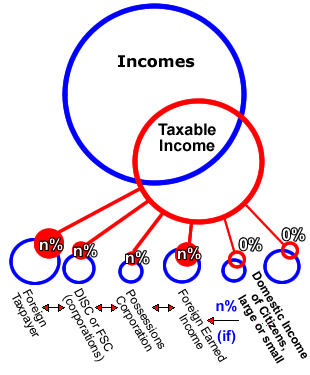
"The following items are not considered to be
exempt, eliminated, or excluded income and, thus, [taxable
items]...
(A) ...foreign taxpayer
(B) ...DISC or FSC [corporations]
(C) ...possessions corporation
(D) Foreign earned income
Code of Federal Regulations
Title 26, Sec. 861-8T(d)(2)(iii) |
In addition, Form
1040 instructions only require:
"You must report... income... from
sources outside the United States."
- Form
1040 Instructions / www.irs.gov
This command does NOT occur for
income from INSIDE the U.S.
Why are there no written commandments
to report domestic income in 1040 instructions? Did the
editors of the 1040 instructions forget to add this requirement,
all these years.
A major tax fraud is in progress,
but worse, we have been born into a modern-day, high-tech slave
system. Rules or no rules, laws or no laws - we must
pay for that which is not true.
We are now slaves, controlled
by a parasitic class of elites.
What
can be done?
|
|
|
|
|
Attention Researchers
If any link has disappeared, try to copy and
paste the link address at http://www.archive.org
-- DISCLAIMER --
The intended purpose of this website, WhatisTaxed.com,
is to data mine with a computer the Internal Revenue Code, and
the Code of Federal Regulations, Title 26, for the "codes" (e.g.
taxable income, gross income, excluded income, eliminated income,
exempt income, deductions, allocation, apportionment, etc),
for rules, and instructions, for determining income tax. The
results have been published throughout this website. It should
be evident these search methods may be applied to any Title
of Law, or large volume of text, and in any country that
has codified laws and rules. See How to Search.
Nothing is for sale at WhatisTaxed.com.
Information posted at WhatisTaxed.com should not be
considered legal advice and is solely for educational purposes.
The reader should not rely on information provided herein to
determine tax.
Do not accept this
website as tax advice.
WhatisTaxed.com is only tax research from data mining tax
law.
To contribute - See How to Search, and Contact
Us.
We do not sell, promote, or advise anything,
but data-mining, searching, and reading tax code with the only
appropriate code tool ... your computer.
We do find every occurrence of a particular
code-term to establish precisely what is written, and what is
not written in tax law. When we say, no other rule
or statute exists - for example, regarding excluded
income, we show you how many files contain this important
code term, and how we searched for it with a computer. You can
easily verify any of the laws, rules, or code-terms in question,
and you should verify every result because it is your duty
to know and follow the law. Ignorance is no excuse.
You are
responsible for doing your taxes.
Questions: If you have questions, try asking
your Congressperson or Senator.
 Ask your lawmaker to explain these Sec. 861 search
results ...
Ask your lawmaker to explain these Sec. 861 search
results ...
- "eliminated income" - Sec. 1.861-8(d), 1.861-8(d)(2),
1.861-8T(d)(2)
- "excluded and eliminated items of income" - Sec.
1.861-8T(d)
- "eliminated items" - Sec. 1.861-8T(d)
- "excluded income" - Sec. 1.861-8 and 1.861-8T
- "income that is exempt or excluded" - Sec. 1.861-8T(d)(2)
- "specific sources" - Sec. 1.861-8(a)(1)
- "specific guidance" - Sec. 1.861-8(a)(1)
- "how to determine taxable income" - Sec. 1.861-8(a)(1)
- "the rules [of Sec. 1.861-8 ...] for determining
taxable income" - Sec. 1.863-1(c)
- "Exempt income ... defined" - Sec. 1.861-8T(d)(2)(ii)
- "income that is not considered tax exempt" [i.e.
taxable income] - Sec. 1.861-8T(d)(2)(iii)
Source: http://ecfr.gov
Ask your Congressman and Senator ...
 If "Exempt income" is "defined"
in Sec. 861, why is Sec. 861 frivolous?
If "Exempt income" is "defined"
in Sec. 861, why is Sec. 861 frivolous?
Find your Congressperson: http://www.house.gov
Find your Senator: http://www.senate.gov
Answers: If you want answers, you can try
asking the press - the American
media and foreign
media.
The Code of Federal Regulations
When searching tax law, we pay close attention
to 26 CFR...
"the Official Interpretation"
"Federal Income Tax Regulations
(Regs) are the official Treasury Department interpretation of
the Internal Revenue Code"
- Internal
Revenue Manual, 4.10.7.2.3.1
"Federal Tax Regulations pick
up where the Internal Revunue Code (IRC) leaves off by providing
the official interpretation of the IRC"
- http://www.irs.gov/taxpros/article/0,,id=98137,00.html
The Code of Federal Regulations are the rules, written
in plain English, which both the public and the IRS must follow:
"The Service is bound by the
regulations."
- Internal
Revenue Manual, 4.10.7.2.3.4
Since "the Service is bound," we can be sure that
we are playing by the same rules. It does not require a law
degree to understand them. See How to Search and Search Examples.
|
|




- Art. 1, sec. 2, clause 3
- Art. 1, sec. 2, clause 3
- Art. 1, sec. 8, clause 1
- Art. 1, sec. 9, clause 4
- Art. 1, sec. 9, clause 5